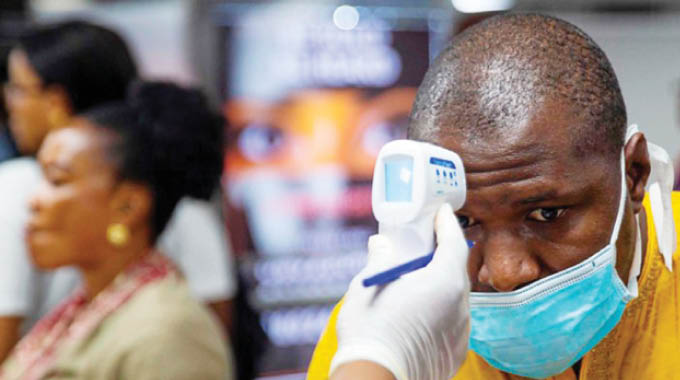President Mnangagwa has said that travellers from ‘high risk countries' will be quarantined for 14 days before they can mingle with Zimbabweans as Zimbabwe upped efforts to stop the spread of COVID-19 pandemic.
Although Zimbabwe is yet to confirm any cases of the pandemic, President Mnangagwa also declared the pandemic a national disaster.
He announced the postponement of the Zimbabwe International Trade Fair, all independence celebrations, international sporting events and gathering of more than 100 people for the next 30 days.
Addressing media at State House Tuesday afternoon, President Mnangagwa, however, said schools would remain open since there are left with two weeks before closing.
"In the wake of the Corona Virus which is now a global pandemic and thus a concern of the whole nation and people of the world, we as Zimbabweans have to play our part. We have worked out a comprehensive response strategy buttressed by strong measure which will ensure we remain safe," he said
He said the COVID-19 pandemic would have a direct impact on the country's economic outlook and Vision 2030 while affecting the tourism and transport sectors.
Zimbabwe gets a large proportion of its tourist from the Chinese and European markets where the pandemic has had devastating effects.
In declaring a National Disaster, President Mnangagwa said this would allow government to mobilise resources while taking the necessary measures in dealing with the pandemic.
"While we have curtailed travel outside the country, travellers from high-risk countries are encouraged to postpone their travel arrangements to Zimbabwe for the next 30 days.
"Zimbabweans traveling from outside the country are encouraged to avoid high-risk countries during the same period," he said.
He, however, announced that all major entry points into Zimbabwe will remain open except un-designated and illegal entry points.
"All hospitals and health facilities are on high alert of the COVID-19 disease while more isolation and treatment centres would be identified," he said.
President Mnangagwa also announced a raft of measures for comprehensive response to the COVID-19 pandemic including strengthening screening and response, creating more isolation centres, strengthening contact tracing and screening and re-enforcing national health systems and institutional frameworks.
Government will also work on improving community hygiene awareness, self-isolation and voluntary travel bans, information dissemination and general awareness while creating a special fund to tackle the pandemic.
All resources mobilised for national events like the Independence Celebrations would be channelled towards curbing the spread of COVID-19.
Meanwhile, the City of Harare has set up a COVID-19 response team which will be headed by health services director Dr Prosper Chonzi.
The team will also work in coordination with several staff members from other council departments as Harare ups its preparedness for the global pandemic.
A joint meeting of the Education, Health, Housing and Community Services, Finance and Development and Human Resources set up the response team Tuesday afternoon.
As part of the recommendations, it was agreed that Harare will institute a strict Covid-29 prevention regime which includes "mandatory hand washing at all council institutions and public places."
In a statement, Dr Chonzi also revealed that three patients who were admitted overnight yesterday all tested negative of the virus.
He, however, urged Zimbabweans to remain vigilant.
"We admitted the three overnight yesterday and we have just received the results that are negative again. We hope it remains like that," he said.
Dr Chonzi also revealed that more people have continued to present themselves for screening while the response is attending to more suspected cases.
"We are now receiving a number of people presenting themselves to the hospital for screening. We are also picking up more suspects that means the momentum is high now. We remain vigilant and hope to respond appropriately when the time comes," he said.
Dr Chonzi said while no cases of COVID 19 have been confirmed in Zimbabwe, the country should take all measures to avoid the spread of the disease adding that public gatherings should be discouraged.
"Our level of preparedness must be as good as if we have a confirmed case so we should try by all means to do away with unnecessary gatherings, practising the social distances that we have been talking about one metre between individuals.
"It will be very difficult to implement that if people are going to be gathering at funerals, students go to school and we also have universities and other universities functioning normally."
He called for effort and consideration for avoiding some gatherings.
"If other countries are doing it, then we should consider doing it. If we remain lackadaisical then we will be hit very hard by this outbreak," he said.
On Zimbabwe's screening methods, Dr Chonzi expressed satisfaction with Zimbabwe's screening methods adding that they have not received any suspected cases from people traveling directly from affected countries.
He, however, revealed that case detection was very loose.
"If it was tight then maybe we would pick only that would test positive but it's very loose. Anyone who presents [themselves] with a fever, with a positive history of travel from a reporting country and with any of the symptoms of flue, cough or respiratory symptoms in nature, we are simply picking and testing," he said.
Globally more than 169,000 people have been infected by the disease while over 6,500 have died.
- finx
 Concern over Masvingo black market
Concern over Masvingo black market  Kenya declares three days of mourning for Mugabe
Kenya declares three days of mourning for Mugabe  UK's Boris Johnson quits over Brexit stretegy
UK's Boris Johnson quits over Brexit stretegy  SecZim licences VFEX
SecZim licences VFEX  Zimbabwe abandons debt relief initiative
Zimbabwe abandons debt relief initiative  European Investment Bank warms up to Zimbabwe
European Investment Bank warms up to Zimbabwe  Young Investment Professional (YIP) Graduate Programme 2019
Young Investment Professional (YIP) Graduate Programme 2019 











 Young Investment Professional (YIP) Graduate Programme 2019
Young Investment Professional (YIP) Graduate Programme 2019
Editor's Pick